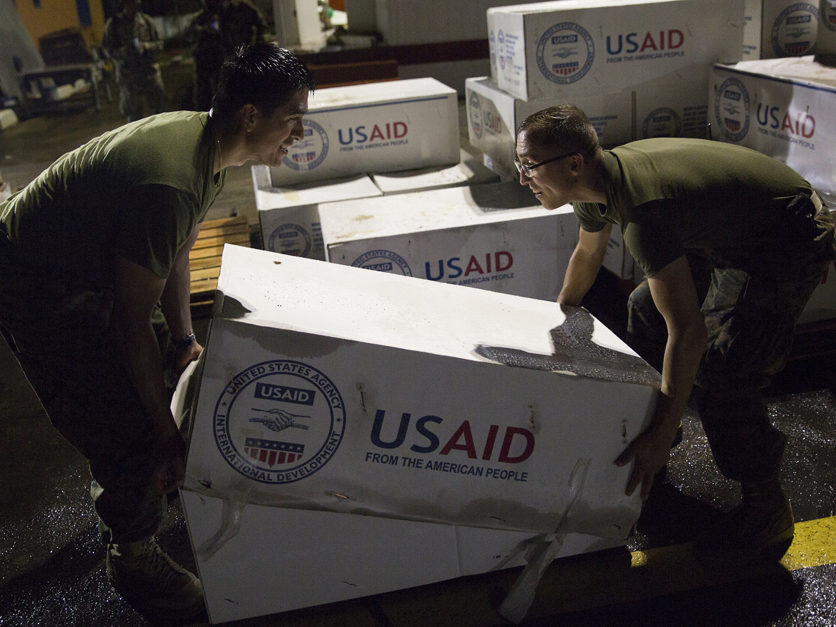WASHINGTON, Oct. 19, 2017 - Key senators charged that rules for U.S. food aid are driving up shipping costs and robbing hungry children of food without benefiting American farmers.
"There are few areas of government where we can have more impact on lives without additional resources than modernizing the food aid program,” Senate Foreign Relations Chairman Bob Corker, R-Tenn., said Thursday as he opened a hearing on the Food for Peace program, which costs about $1.4 billion a year.
At issue are requirements that commodities procured for Food for Peace be U.S. grown and that at least half of the products be shipped on U.S.-flagged vessels. The “cargo preference” requirement for using U.S.-flagged ships is supposed to ensure that there would be sufficient American shipping capacity in the event of a major security crisis.
But Corker, who has battled with the congressional agriculture committees over the food aid rules, said that only five of 175 U.S.-flagged cargo vessels now rely on food aid to justify staying in business and only one of those is capable of carrying military cargo. The vast majority of food aid moves on ships “incapable of moving military cargoes,” Corker said.
The committee’s ranking Democrat, Ben Cardin of Maryland, said “we can feed more people and save more lives.”
The increased cost of shipping on U.S.-flagged ships can be considerable, the committee was told. A 2015 study by the Government Accountability Office found that it increased the overall cost of shipping food aid by an average of 23 percent, or $107 million, from 2011 through most of 2014.
A charity that delivers a significant portion of the food aid, Catholic Relief Services, found that the premium for U.S. shipping can be much higher than that. For 2013 through 2015, U.S.-flagged carriers charged 31 percent more than foreign-flagged carriers for commodities supplied through the U.S. Agency for International Development.
For commodities supplied by the Agriculture Department, the premium for U.S. carriers was even higher: Shipping on U.S.-flagged vessels cost 124 percent, said Bill O’Keefe, CRS’ vice president for government relations and advocacy. If U.S. carriers had matched the foreign rates, the group would have spent $23.8 million less on shipping and could have served 500,000 more people, he said.
According to GAO, shipping costs are considerably higher for USDA programs than for USAID because USDA is under a court order to interpret the cargo preference rules in a more restrictive way. GAO has recommended that Congress clarify the issue, but no legislation has been introduced, said Thomas Melito, director of international affairs and trade for GAO.
Cornell University economist Chris Barrett estimated that the restrictions on food aid programs, including the requirement for using U.S. commodities for Food for Peace as well as cargo preference, wastes $350 million to $400 million, costing the equivalent of at least 3 million child life-years annually. “Given global life expectancy at birth of roughly 70 years, a conservative estimate is that we sacrifice roughly 40,000 children’s lives annually because of antiquated food aid policies,” he said.
The hearing comes as Congress is preparing to write a new farm bill, which provides rules for Food for Peace, and to reauthorize the Global Food Security Act, which authorizes USAID spending on emergency food assistance and overseas agricultural development.
The 2014 farm bill includes a longstanding “monetization” provision that allows charities to sell U.S. commodities to fund their relief and development work.
The House Agriculture Committee has pushed back hard against proposals to end restrictions on Food for Peace.
During House floor consideration of the Global Food Security Act, the chairman of the House Foreign Affairs Committee, Ed Royce, assured Agriculture Chairman Mike Conaway that the legislation would not be used to change rules for Food for Peace. The legislation authorized USAID’s Emergency Food Security Program, which allows the use of electronic vouchers and locally procured commodities to feed refugees and other people in crisis. Royce, R-Calif., said the two programs were intended to continue operating in parallel.
Corker and Sen. Chris Coons, D-Del., maintained at Thursday’s hearing that farmers are less supportive of the Food for Peace requirements when they understand how they increase program costs. Coons said that when he explains the issue to Delaware farmers it “makes them crazy and concerned that we be more efficient.”
#30


